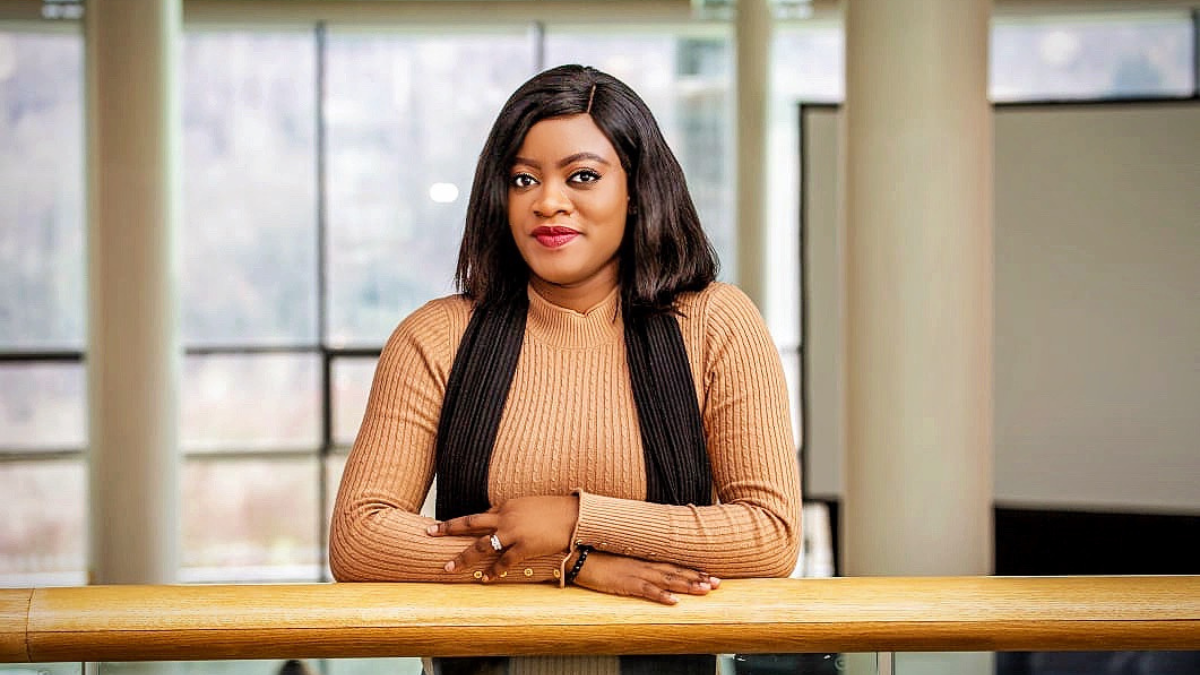We caught up with International Business Management student Obianuju, previous winner of the Sustainable Development Goals (SDG) Ideas Competition, to reflect on her experience. She tell us more about her innovative idea and why others should consider taking part in the competition.
The SDG Ideas Competition is run monthly during Semester 1 and 2 by our Entrepreneurship and Innovation Group. All RGU students can participate and submit an innovative idea that would tackle one of the 17 UN Sustainable Development Goals. The winner gets awarded £100 and two highly commended entries receive £50 each.
Can you describe your winning idea?
My winning idea focused on increasing circular economy practices through a collaborative recycling reward programme. The aim of this initiative is to create a positive impact on as many environments and communities all over the world as possible by promoting and encouraging active and purposeful recycling while rewarding participants with incentives through a wireless loyalty card/programme which I named RE-TAP (Recycle and Tap).
In respect to tackling the UN SDG’s, my idea also addresses 5 goals which include 3-(Good Health and Wellbeing), 11-(Sustainable Cities and Communities), 12-(Responsible Consumption and Production), 13-(Climate Action) and 17-(Partnerships for the Goals).
What inspired you to develop this particular idea?
I was very interested in participating in the competition even though I did not have any idea at the time. To get inspiration, I decided to study the 17 UN SDG’s and tried to come up with an initiative that could address at least one of the goals, which was a requirement to qualify for the winning slots.
Moving to the UK and trying to adjust to separating recyclable materials from general waste was new for me because it is not common in my country of Nigeria. One evening, I was in the kitchen with my husband, and we were reflecting on the same thought regarding how difficult it would be to encourage people in countries where recycling is not part of the culture to participate in active recycling. And the lightbulb came up: “what if they are given incentives to encourage them to do so?”
What challenges did you encounter during the development of your idea?
When I came up with this initiative, I was very excited, because I didn’t even know that it already existed. I submitted my idea with the hope to develop it further even if I didn’t win. When I eventually won, I decided to do some deeper research as I advanced to the RGU Innovation Awards Levels, and I was a little bit discouraged when I found that other organisations where already doing something similar.
I remembered the saying “The sky is too wide for two birds to collide” and that encouraged me to do what I could to bring my idea to reality. I also realised that executing this idea required a much broader and deeper understanding than my initial imagination, so I applied for a PhD in Environmental Sustainability to give me the leverage of fully combining the knowledge from the research period with my idea. But that didn’t work out as well, for now! Nonetheless, It is a very valuable area and I look forward to executing this idea in the nearby future.
How do you plan to scale or expand your project to have a broader impact?
I plan to carefully plan and apply strategic approaches to implement and eventually expand my idea. By engaging in broader studies, partnering with the right bodies to reach and impact as many parties as possible, and developing as trends change, I believe that this initiative will achieve its aim.
I would love to collaborate with the United Nations, relevant government organisations, production companies, supermarkets and relevant outlet chains who are the direct points of contacts for consumers, as they will be responsible for collecting and redirecting the recycled materials to the right channels.
What advice do you have for aspiring changemakers who want to engage with the SDG competition?
Consider your life to be a plant that develops into a tree, with strong roots made up of numerous areas of your life such as personal, spiritual, intellectual, and professional components. Your life is divided into branches based on the life choices and growth possibilities you have pursued throughout your journey. Depending on how you nurture your life, these possibilities will produce leaves and fruits, which will eventually be the skills and benefits gained through taking advantage of these development opportunities.
The SDG Competition is one of those branches that has helped to build my tree by providing extra competences as well as increasing confidence in thinking outside of my field and comfort zone. Participating in this competition and the RGU Innovations Awards helped me in a variety of academic areas. I grew more open-minded and was able to use my creativity, curiosity, cross-disciplinary skills, and other abilities into excelling at my academic work.
I strongly encourage everyone who has the chance to participate to take advantage of this competition, the RGU Innovation Awards, and other EIG resources. Remember that it is not just about the winning title and the monetary reward, but also about developing your future potential.
Obianuju Iheji


3 responses to “My £100 winning idea for RGU’s SDG competition”
Love the tree idea Obianuju, the branches of our lives is a wonderful way to think of things
Thank you for your comment. We found Obianuju’s ideas very inspiring as well!
[…] My £100 winning idea for RGU’s SDG competition […]